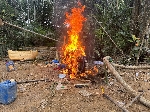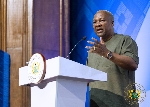Ghana rolls out HPV vaccine to combat cervical cancer, targeting 2.5 million girls
 Dr Grace Ayensu-Danquah take a shot of HPV vaccine at the launch in Accra
Dr Grace Ayensu-Danquah take a shot of HPV vaccine at the launch in Accra
The Minister of Health, Kwabena Mintah Akandoh, has announced the launch of the Human Papillomavirus (HPV) vaccine in Ghana, aimed at combating cervical cancer.
The vaccine will be administered to girls aged between 9 and 14 years.
The Minister expressed concern about the high mortality rate associated with HPV, citing that out of 3,000 new cases recorded annually, about 2,000 result in death.
He emphasised the need for collective action to combat the disease.
The Minister assured the public that the HPV vaccine is safe and effective, having been approved by the Food and Drug Authority (FDA) and the World Health Organisation (WHO).
He noted that several African countries, including Rwanda, South Africa, and Botswana, have already introduced the vaccine.
The Minister announced that the HPV vaccine will be part of the country's free primary healthcare programme, targeting at least 2.5 million girls.
He urged parents and caregivers to support the vaccination programme and bring their eligible children for vaccination.
The Minister emphasised the importance of vaccination in preventing cervical cancer and protecting the girl child.
He noted that the vaccine has been piloted in the country from 2013 to 2018 and has been found to be safe.
The Minister assured the public that consent forms have been distributed to schools, and vaccination will be voluntary.
He urged parents to give their consent and allow their children to be vaccinated.
The Minister called on the public to support the vaccination programme and stand united in the fight against HPV.
He expressed gratitude to the government and partners for their support in introducing the vaccine.
The vaccination programme will target girls aged between 9 and 14 years, with the aim of protecting them against cervical cancer.
The Minister emphasised that the vaccine is a crucial step in protecting the health and well-being of the girl child.
Source: Classfmonline.com/Edem Afanou
Trending News

NAiMOS task force intensifies river patrols to clamp down on illegal mining
11:45
Mahama honours UDS football team for historic World University Games victory
16:53
Bryan Acheampong: “I am for power that works for the people”
08:53
Galamsey: President Mahama announces launch of RCMSD to restore degraded lands
20:17
Deputy Finance Minister assures unpaid nurses and midwives of salary resolution in Nov. budget
03:03
Duayaw Nkwanta chiefs deny involvement in illegal mining
07:53
President launches 2025 National Cyber Security Awareness Month
12:11
Ghana rolls out HPV vaccine to combat cervical cancer, targeting 2.5 million girls
11:36
W/R: 12 people arrested over alleged illegal mining activities that damaged Takoradi–Nsuta railway line
13:27
GA/R: Weija- Gbawe MCE urges residents to make cleaning a daily habit
08:47




